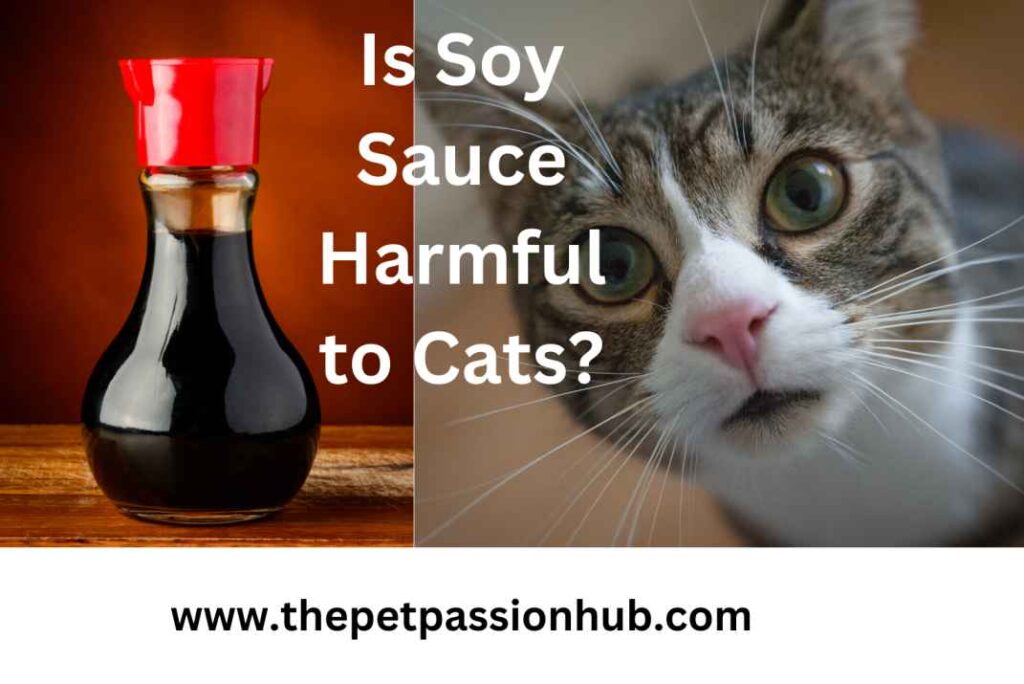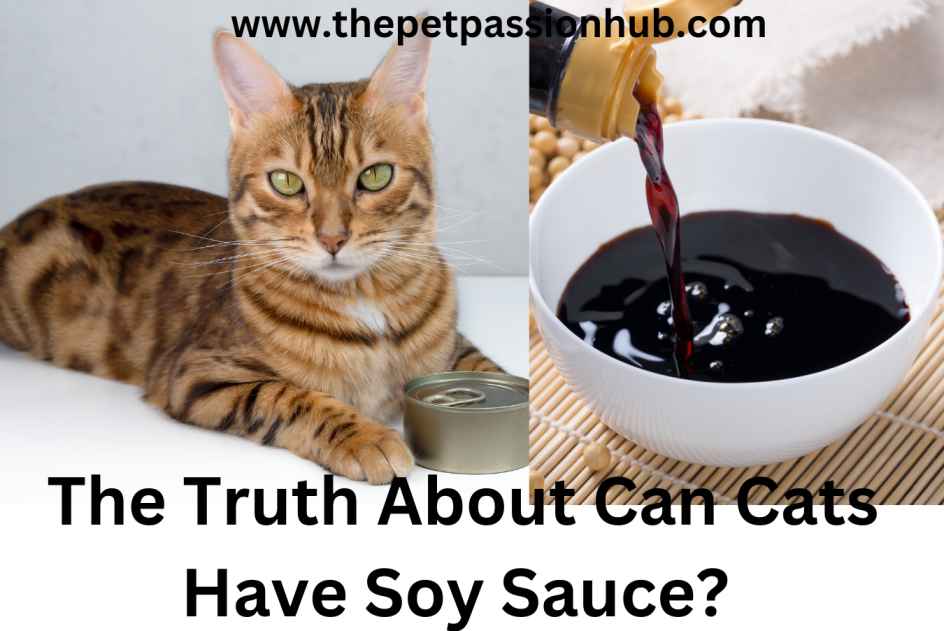Introduction
Can cats have soy sauce? This seemingly quirky question has sparked a myriad of debates and controversies in the feline-loving community.
As pet owners, we are constantly bombarded with conflicting information about what is safe and suitable for our beloved furballs. However, when it comes to the enigmatic world of soy sauce and its potential impact on our feline friends. The answers are not as straightforward as one might think.
So buckle up, because we are about to dive into the truth behind this intriguing question. Can cats indulge in a little taste of soy sauce without any repercussions?
Understanding soy sauce and its ingredients
Soy sauce is a staple condiment in many households, known for its rich umami flavor and versatile uses in cooking. But what exactly goes into this dark, savory liquid?
Traditionally, soy sauce is made from a combination of fermented soybeans and wheat, with the addition of salt and water.
The fermentation process gives soy sauce its complex flavor profile and distinct aroma. Making it a beloved ingredient in various cuisines around the world.
When it comes to the question of whether cats can have soy sauce. It’s vital to understand the potential effects on our feline companions.
While soy sauce itself is not toxic to cats in small amounts due to its basic ingredients. The high sodium content poses a significant risk.
Excessive consumption of soy sauce can lead to salt poisoning in cats, causing symptoms such as vomiting, diarrhea, excessive thirst or urination, and potentially leading to more severe conditions if left untreated.
As responsible pet owners, it’s crucial to be aware of how certain human foods like soy sauce. It can impact our pets’ health and well-being.
Can Cats Taste Soy Sauce?

While cats are known for their discerning taste buds. It’s important to be cautious when it comes to offering them soy sauce.
Unlike humans, cats do not have the same taste receptors for detecting sweet and salty flavors. Instead, their preference lies in protein-rich foods such as meat.
This means that while they may technically be able to taste soy sauce. It is unlikely to appeal to their taste preferences.
If you do decide to offer your cat a small amount of soy sauce as an occasional treat, it’s crucial to exercise caution. Soy sauce contains a high level of sodium, which can be harmful to cats in large quantities.
Furthermore, some soy sauces also contain ingredients like garlic or onion powders which are toxic to felines. Always consult with your veterinarian before introducing any new food items into your cat’s diet and ensure that moderation and safety are top priorities when offering soy sauce or any other human foods to your furry friend.
Think Twice: The Shocking Truth About Can Cats Eat Pepper!
Potential Risks of Soy Sauce for Cats
Soy sauce, a popular condiment in many households, may seem harmless to humans but can pose potential risks for cats. One of the major concerns is the high sodium content in soy sauce, which can lead to salt poisoning in cats if consumed in large quantities.
Excessive intake of soy sauce can cause dehydration, vomiting, diarrhea, and even lead to more severe conditions such as kidney damage.
Furthermore, soy sauce contains ingredients like onion and garlic derivatives that are toxic to cats. These ingredients can disrupt a cat’s red blood cell count and lead to anemia or other serious health issues.
Additionally, certain types of soy sauce may contain alcohol or other additives that are harmful to felines. It’s important for cat owners to be aware of these potential risks and avoid exposing their pets to soy sauce and any foods containing it.
Is Soy Sauce Harmful to Cats?

Soy sauce, a staple in many Asian cuisines, is often used to add flavor to various dishes. However, when it comes to cats, consuming soy sauce can be harmful.
Soy sauce contains high levels of sodium, which can be detrimental to a cat’s health. Excessive salt intake can lead to dehydration and even sodium ion poisoning in cats.
Furthermore, soy sauce also contains small amounts of garlic and onions, both of which are toxic to cats. Even in small doses, these ingredients can cause damage to a cat’s red blood cells and lead to anemia or other health complications.
It’s important for cat owners to be mindful of the ingredients in the food they offer their pets and avoid giving them any foods that contain potentially harmful substances like soy sauce.
In conclusion, while a taste of soy sauce may seem harmless, the potential risks it poses for cats should not be overlooked.
It’s crucial for pet owners to prioritize their cat’s wellbeing by being aware of what they consume and ensuring that their diet aligns with their nutritional needs.
Avoiding foods like soy sauce that could potentially harm our feline companions is an essential part of responsible pet ownership.
Alternatives to Soy Sauce for Cats
While soy sauce may be harmful to cats due to its high salt content and potential for causing digestive issues, there are several alternatives that can add flavor to your feline friend’s diet.
One popular substitute is fish sauce, which provides a savory taste without the high sodium levels found in soy sauce.
Additionally, coconut aminos offer a slightly sweet and salty flavor profile that can be used sparingly as a cat-safe seasoning.
Another alternative to soy sauce for cats is bone broth, which not only enhances the taste of their food but also provides essential nutrients and hydration.
This natural alternative contains collagen, amino acids, and minerals that can benefit your cat’s overall health. With these safe and flavorful alternatives at hand, you can ensure that your cat enjoys their meals without risking any potential harm from soy sauce.
By exploring these alternatives to soy sauce for cats, you can provide variety in their diet while prioritizing their well-being.
It’s essential to be mindful of the ingredients you use in your pet’s food and avoid exposing them to potentially harmful substances like soy sauce.
With these safe substitutions available, you can enhance your cat’s culinary experience while promoting their health and happiness.
Cat Owner Experience
A cat owner mistakenly gave their cat a small amount of soy sauce and the cat experienced vomiting and diarrhea shortly after. This incident highlights the importance of being aware of the potential dangers of giving certain human foods to pets. Cats should not given soy sauce as it contains ingredients that are harmful to them.
Conclusion: The Verdict on Cats and Soy Sauce
In conclusion, the verdict on cats and soy sauce is clear: it’s best to avoid giving soy sauce to your feline friend. While a small amount of soy sauce may not immediately harm your cat, the high sodium content can be detrimental to their health in the long run.
Cats are obligate carnivores and have specific dietary needs that should met with a balanced diet of high-quality protein sources, making soy sauce unnecessary and potentially harmful.
Furthermore, soy sauce contains ingredients such as wheat and soybeans that could trigger allergies or intolerances in some cats.
It’s essential for cat owners to prioritize their pet’s well-being by sticking to recommended feline diets rather than introducing unnecessary condiments that could lead to health issues.
Ultimately, when it comes to cats and soy sauce, it’s better to err on the side of caution and avoid including it in their diet altogether.
FAQs
Q: Can cats have soy sauce?
A: No, it is not safe for cats to consume soy sauce.
Q: What happens if my cat ingests soy sauce?
A: Ingesting soy sauce can lead to sodium poisoning in cats, which can be fatal.
Q: Are there any health benefits for cats from consuming soy sauce?
A: No, there are no health benefits for cats from consuming soy sauce.
Q: Can a small amount of soy sauce be given to cats as a treat?
A: No, even a small amount of soy sauce can be harmful to cats and should never be given to them as a treat.
Q: What are the symptoms of soy sauce poisoning in cats?
A: Symptoms of poisoning may include vomiting, diarrhea, excessive thirst, lethargy, and seizures.
Q: How should I store soy sauce to keep my cat safe?
A: Store soy sauce securely out of reach of your cat to prevent accidental ingestion.
Q: Is there an alternative to soy sauce that is safe for cats?
A: Cats do not need or benefit from consuming any type of sauces, so it’s best to avoid offering them any at all.
Q: What should I do if my cat accidentally ingests soy sauce?
A: Seek immediate veterinary attention if your cat has ingested any amount of soy sauce.
